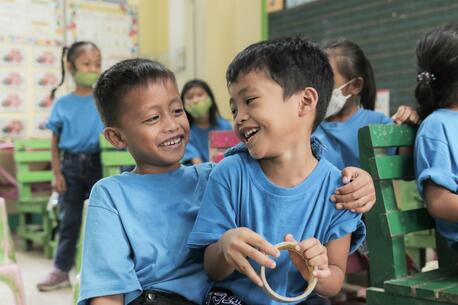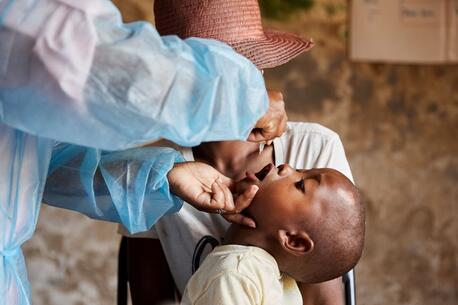
READ Act Reauthorization a Victory for Young Learners Worldwide
Great news! Congress passed the reauthorization of the READ Act, ensuring that U.S. foreign assistance will continue to prioritize equitable access to quality education for children globally.
Every child has the right to learn
On Dec. 23, 2024, President Joe Biden signed a broad bill package into law, which includes the READ Reauthorization Act of 2023 (H.R. 681/S.41). A policy priority for UNICEF USA, this advocacy achievement takes an important step towards securing every child's right to quality inclusive basic education.
Since the beginning of the 118th Congress back in January 2023, UNICEF USA has rallied supporters across the country — youth, partners, donors and advocates — in support of this legislation, which complements the work UNICEF does in 147 countries to provide quality learning opportunities that prepare children and adolescents with the knowledge and skills they need to thrive.
Education access strengthens economies and reduces inequality
Alongside UNICEF, the U.S. Government has been a leader in supporting other governments to strengthen their basic education programs. Congress passed the original READ (Reinforcing Education Accountability in Development) Act in 2017, mandating a U.S. Government Strategy on International Basic Education. The U.S. Agency for International Development (USAID) reports that programs implemented between 2019 and 2023 as a result of that mandate reached more than 34 million learners annually. In total, over the five years, U.S. foreign assistance programs trained 2.9 million teachers and educators, supplied 176 million textbooks and other teaching and learning materials, and worked to strengthen education systems, including by adopting 525 new or reformed laws and policies.
A great example of UNICEF and USAID's partnership for impact comes from the Philippines, where less than 25 percent of children attend early childhood education programs and only 10 percent of Grade 5 students achieve minimum proficiency levels in reading — and where frequent natural disasters threaten to disrupt education. With nearly 40 million children, improving learning outcomes is fundamental for shaping the future of the Philippines.
USAID reported that in fiscal year 2023, more than 4 million children in the Philippines received education interventions at the primary and secondary levels — more than any other country except India. Working together to support the Philippines' Department of Education, UNICEF and USAID can continue to amplify their impact in improving early grade learning, strengthening teacher training programs and supporting out-of-school youth.
USAID support for UNICEF and other partners, including international NGOs and local community-based organizations, is made possible through Congressional authorization like the READ Act. UNICEF USA is thrilled that after nearly two years of effort, utilizing a range of advocacy tools at strategic moments, Congress heard our collective call to action and passed this bill in the nick of time before the 118th Congress concludes later this month.
Thank you to UNICEF USA advocates for children's education
Thank you to all UNICEF USA advocates who came together to champion this important legislation, including UNICEF Ambassador Aria Mia Loberti, and to the bill's original co-sponsors, Representatives Grace Meng (D-NY) and Chris Smith (R-NY) and Senators Marco Rubio (R-FL) and Dick Durbin (D-IL), for their leadership in prioritizing READ. Together, we can #ShapetheFuture where every child has access to the transformative power of a quality education.
HOW TO HELP
There are many ways to make a difference
War, famine, poverty, natural disasters — threats to the world's children keep coming. But UNICEF won't stop working to keep children healthy and safe.
UNICEF works in over 190 countries and territories — more places than any other children's organization. UNICEF has the world's largest humanitarian warehouse and, when disaster strikes, can get supplies almost anywhere within 72 hours. Constantly innovating, always advocating for a better world for children, UNICEF works to ensure that every child can grow up healthy, educated, protected and respected.
Would you like to help give all children the opportunity to reach their full potential? There are many ways to get involved.





